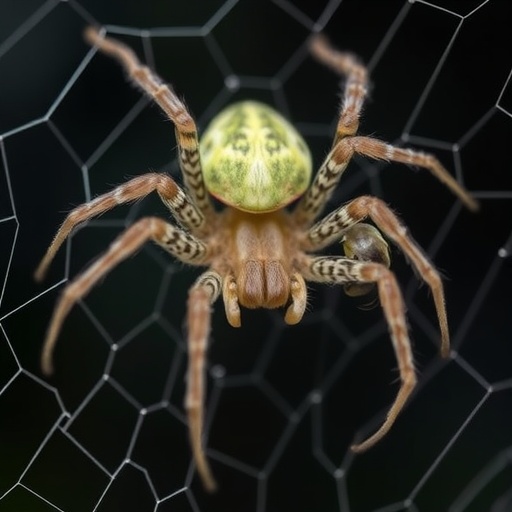In recent research, an intriguing study highlights the remarkable maternal care behaviors exhibited by a newly identified ghost spider genus known as Eldar. This study delves into how these arachnids navigate the challenges of motherhood while fending off predatory threats, particularly those posed by a newly classified fly species, Pseudogaurax. The extensive analysis offers invaluable insights into the complex interactions within the ecosystem and showcases the evolutionary adaptations that enable these spiders to thrive.
Ghost spiders are recognized for their elusive nature and adept hunting strategies. However, this new research unveils a facet of their behavior rarely observed: the intense maternal instinct displayed by female spiders of the genus Eldar. These spiders, characterized by their delicate morphology and stealthy predatory techniques, take on the monumental task of nurturing their offspring under precarious circumstances. The study authored by Villanueva-Bonilla, de Oliveira, and Brescovit investigates the efficiency of maternal care strategies employed by these solitary mothers.
The study notes that female Eldar spiders sacrifice personal safety and energy to ensure the survival of their young. The species displays a surprising level of maternal investment; females create protective silk structures to safeguard their eggs, a behavior that could be indicative of an advanced evolutionary trait. This spider’s dynamic parenting style exemplifies how instinctual behaviors evolve in response to environmental pressures and predation risks, emphasizing the balance that must be struck between foraging and child-rearing.
One of the most compelling aspects of this research is the interaction between Eldar spiders and the recently described Pseudogaurax, a predator that preys on the spider’s offspring. As a thinly veiled challenge to survival, these flies represent an evolving threat that the Eldar mothers must contend with. The study elaborates on how these female spiders develop sophisticated mechanisms to protect their young from such predatory species, making strategic decisions that showcase their problem-solving capabilities. They are not merely passive victims of circumstance but dynamic participants in a complex web of ecological interactions.
It is fascinating to observe how the channeling of energy towards maternal duties can lead to decreased foraging efficiency, thus presenting a double-edged sword for these spiders. The mothers’ defense strategies against Pseudogaurax involve both physical and behavioral adaptations. The capacity to modify their approach based on environmental factors reflects a deep understanding of their habitat and potential threats.
Using rigorous methodologies, the researchers analyzed various factors to quantify the effectiveness of the mothers’ care strategies. They observed several aspects, from the time spent in guarding their eggs to direct confrontations with the Pseudogaurax flies. Telemetric tracking provided a glimpse into the movements and reactions of the spiders in response to different stimuli, laying bare the intricate relationship between predator and prey.
These results underscore the need for continued research in behavioral ecology, especially in relation to maternal care in arachnids. The implications extend beyond the Eldar spiders and Pseudogaurax, inviting a broader examination of how maternal instinct and ecological pressures drive evolutionary changes across various taxa. By understanding these interactions, researchers can draw parallels to other species, potentially enriching our comprehension of behavioral adaptations across the animal kingdom.
Beyond the initial findings, the study elucidates the importance of genetic variations within the Eldar genus. The spiders’ phenotypic traits may vary significantly based on their geographical locations, impacting their defensive strategies. This variability offers an exciting opportunity to explore how local environmental factors act on the evolution of maternal care behaviors.
The researchers advocate for further exploration into the intricate ecological networks that support these spiders, acknowledging that an understanding of such interactions can lead to significant revelations about biodiversity and the delicate balance of ecosystems. While focusing on exceptional cases like the Eldar spiders, we are reminded that hidden stories abound in nature, waiting to be dissected and understood.
Consequently, the researchers encourage both citizen scientists and academic communities to observe and report on spider behavior, enhancing a collective database that can inform future research. As Pseudogaurax continues to evolve, new questions arise regarding the adaptations needed to navigate this relentless cycle of survival, prompting an exciting challenge for evolutionary biologists.
In conclusion, this research serves as a call to appreciate the complexities of animal behavior and the nuanced interactions that shape the survival strategies of species. It artfully portrays the ghost spider’s struggle as not only a tale of solitude in motherhood but also one of resilience against inherent threats in their environment. The layers of complexity present in Eldar spiders’ maternal care could be a window into many other species facing similar ecological pressures.
This groundbreaking study leads us into new realms of inquiry, showcasing nature’s relentless ingenuity and resilience amidst adversity. As we delve deeper into the lives of those that dwell in shadows, we uncover narratives that reveal not just survival, but a profound dance of life intricately woven into the fabric of our ecosystems.
Subject of Research: Maternal care efficiency of the ghost spider of new genus Eldar against new species Pseudogaurax.
Article Title: Many problems for a solo mother: maternal care efficiency of the ghost spider of new genus Eldar (Araneae: Anyphaenidae, Anyphaeninae) against new species Pseudogaurax Malloch (Diptera: Chloropidae).
Article References:
Villanueva-Bonilla, G.A., de Oliveira, L.F.M., Brescovit, A.D. et al. Many problems for a solo mother: maternal care efficiency of the ghost spider of new genus Eldar (Araneae: Anyphaenidae, Anyphaeninae) against new species Pseudogaurax Malloch (Diptera: Chloropidae). Sci Nat 112, 33 (2025). https://doi.org/10.1007/s00114-025-01982-4
Image Credits: AI Generated
DOI: https://doi.org/10.1007/s00114-025-01982-4
Keywords: Maternal care, ghost spider, Eldar, Pseudogaurax, ecological interactions, behavioral ecology, evolutionary adaptations.




